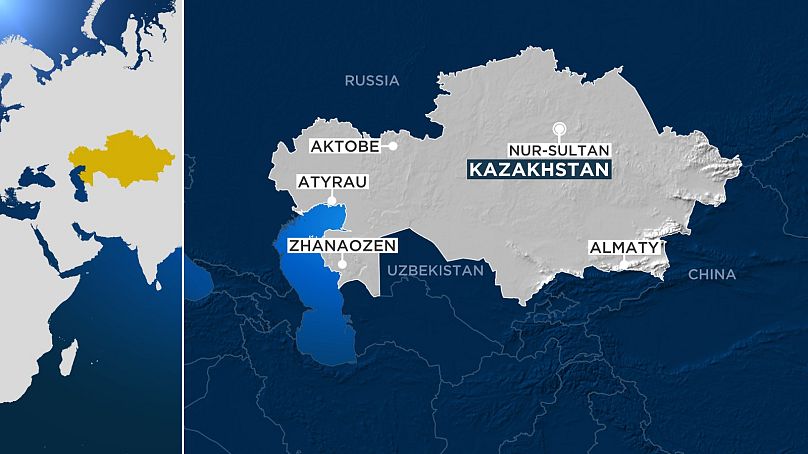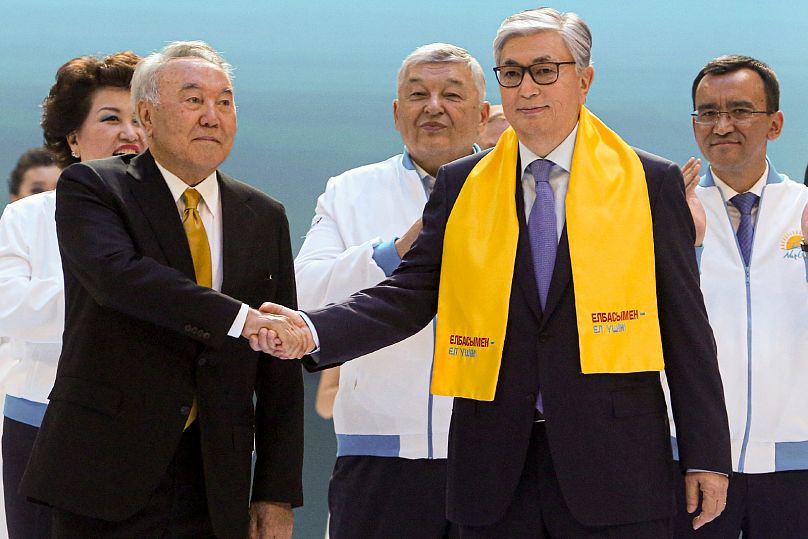The scale of the protests is unprecedented. Why and what next for the Central Asian country?
Kazakhstan is engulfed in the worst street protests since the country gained independence three decades ago with government buildings set ablaze and dozens of protesters killed.
 ADVERTISEMENT
ADVERTISEMENT
 ADVERTISEMENT
ADVERTISEMENT
The protests started in the southwestern oil town of Zhanaozen on 2 January over sharp increases in gas prices.
But they quickly spread across the country with demonstrations in Nur-Sultan and Almaty, the economic capital.
In a bid to quell the unrest, authorities first cut the price of gas.
President Kassym-Jomart Tokayev then dismissed the entire government. He also declared a state of emergency in several areas, including Almaty, where there is a nighttime curfew.
Later, Tokayev changed tack, describing the protesters as "terrorists" under "foreign" influence and demanding military backing from the Collective Security Treaty Organisation, a Russian-led military alliance.
Authorities confirmed on Thursday that "dozens" of protesters have been killed and that more than 1,000 had been injured in clashes with police.
Why are people angry?
Of the five Central Asian republics that gained independence following the dissolution of the Soviet Union, Kazakhstan is by far the largest and the wealthiest.
It spans a territory the size of Western Europe and sits atop colossal reserves of oil, natural gas, uranium and precious metals.
But while Kazakhstan’s natural riches have helped it cultivate a solid middle class, as well as a substantial cohort of ultrarich tycoons, financial hardship is widespread and the banking system has fallen prey to deep crises precipitated by non-performing loans. As in much of the rest of the region, petty corruption is rampant.
Resentments have long festered in Zhanaozen and its wider area over a sense that the region's energy riches haven't been fairly spread among the local population.
In 2011, police shot dead at least 15 people in the city who were protesting in support of oil workers dismissed after a strike.
When prices for the liquified petroleum gas most people in the area use to power their cars doubled overnight Saturday, patience snapped.
Are protesters aiming their anger at Kazakhstan president Kassym-Jomart Tokayev?
The suppression of critical voices in Kazakhstan has long been the norm. Any figures aspiring to oppose the government have either been repressed, sidelined, or coopted. So although these demonstrations have been unusually large — some drawing more than 10,000 people, a large number for Kazakhstan — no protest movement leaders have emerged.
For most of Kazakhstan's recent history power was held in the hands of former President Nursultan Nazarbayev. That changed in 2019 when Nazarbayev, now 81, stepped aside and anointed his long-time ally Tokayev as his successor. In his capacity as head of the security council that oversees the military and security services, Nazarbayev continued to retain considerable sway over the country. Tokayev announced Wednesday that he was taking over from Nazarbayev as security council head.
Much of the anger displayed on the streets in recent days was directed not at Tokayev, but at Nazarbayev, who is still widely deemed the country’s ultimate ruler. “Shal ket!” (“Old man go”) has become the main slogan.
"The people are tired of the schizophrenic arrangement of the current government in Kazakhstan, where no one knows exactly where decisions are made, whether in the administration of President Tokayev or in the administration of the first President Nazarbayev," political analyst Arkady Dubnov told Euronews.
Tokayev's concession on that front — the removal of Nazarbayev as the head of the security council — is too little too late, Dubnov suggested. "People are demanding fundamental economic and political reforms. People are demanding representation in parliament, freedom of speech, and freedom of political party activity."
The analyst described the ongoing events as "pre-revolutionary" with similarities to the Arab Spring and Ukraine's Maidan movement in 2013.
Is the regime likely to be toppled?
This is uncharted territory for Kazakhstan. The country has seen major demonstrations before: In 2016, after the passage of a contentious land law. And again in 2019, after the contentious election that secured Tokayev’s hold on power. But never anything on this scale.
In one of his appeals to the public Wednesday, Tokayev pledged to pursue reforms and hinted that political liberalisation might be possible. His darker remarks toward the end of the day, however, suggested he would instead go down a more repressive road.
Temur Umarov, a research consultant at the Carnegie Centre in Moscow, told Euronews that "so far, the situation is not critical".
"It seems to me that what is happening will not be the end of the current political regime. (...) Now we will just observe such bargaining between the protesters and the authorities. The authorities will make concessions, the protesters will say whether these concessions are enough for them or not," he explained.
"Reforms are 100 per cent going to happen. We've been seeing them for the last few years. It is a trend that would have happened without the protests, but now it will accelerate and the authorities will go for them even more. But they (the reforms) are possible only if the protests do not cross a line after which the authorities believe that they are in a stalemate. And then we'll see violence," Umarov said.
Because the street protests are so lacking in focus, at least for now, it's difficult to see how they might end.
But even if they fail to topple the government, it looks possible they might lead to deep transformation.
What is not clear is what that might mean.












